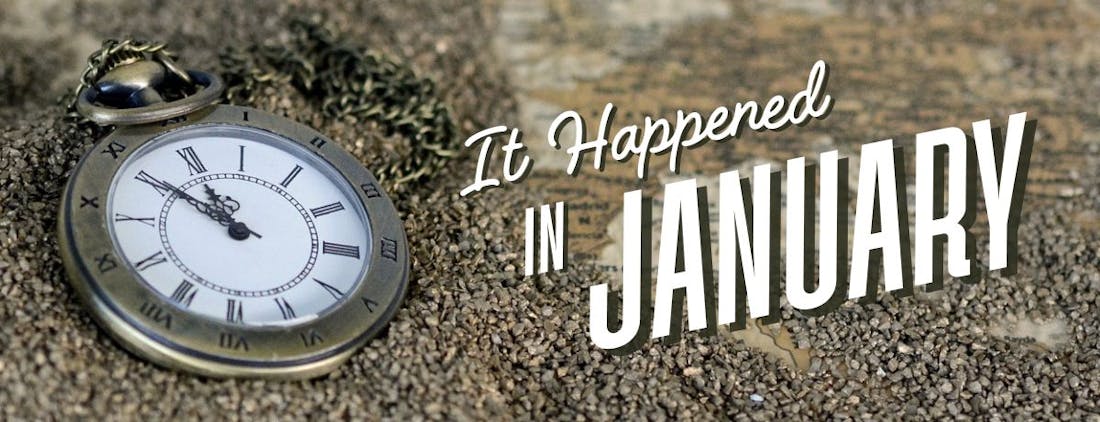
View Historical Events by Day: What Happened on January 18 in History?
Explore the historical events that shaped our world on January 18th. From major milestones to cultural achievements, see what happened on this day in history. Dates for earlier events may be approximate.
Note: Sources for the historical content shown, include research and reviews of relevant Online History Resources or printed material. When possible, we show a link to a source which provides additional or unique perspective about the event.
We do our best to provide accurate information but would appreciate being notified if any incorrect information is found. You may do so by using our Feedback link.
Thales of Miletus, a Greek philosopher often considered the first Western philosopher, dies in Greece.
The Byzantine general Belisarius enters Rome during the Gothic War.
Michael VIII Palaiologos is proclaimed co-emperor of the Byzantine Empire.
The Second Council of Lyon is convened by Pope Gregory X, focusing on church reunification and crusade plans.
King Edward I of England issues the Edict of Expulsion, ordering the expulsion of Jews from England.
The Council of Acre ends, marking the collapse of the Crusader Kingdom of Jerusalem.
The Pope confirms the Knights Templar's privileges despite ongoing controversies surrounding the order.
The Cortes of Leiria in Portugal is convened by King Afonso IV to address various issues in the kingdom.
The Golden Bull of Emperor Charles IV establishes the electoral college of the Holy Roman Empire.
The Union of Florence is signed, aiming to reconcile the Eastern and Western churches.
The first printed edition of the Vulgate Bible is published by Johann von Speyer in Rome.
The Treaty of Bagnolo is signed, ending the War of Ferrara between Venice and the Papal States.
The city of Lima, Peru, is founded by Spanish conquistador Francisco Pizarro on the central coast of Peru. Founded on the then Julian Calendar's Catholic holiday of Epiphany, when the Three Kings visited the baby Jesus, and was therefore known as Ciudad de los Reyes or City of the Kings.
Cathedral of Lima, Peru. (1854) - The Cathedral Foundation Stone was laid by Francisco Pizarro (1535)
Source: Exploration of the Valley of Amazon vol.1 by Lieutenant William Lewis Herndon, U.S.N. Author William Lewis Herndon (1813–1857)
Santiago, Chile, is founded by Spanish conquistador Pedro de Valdivia.
Protestant reformer Martin Luther dies in Eisleben, Germany.
A French army led by Henry II of France and the Duke of Guise capture the city of Siena, Italy, during the Italian War of 1551–1559.
Battle of Talikota in India sees the defeat of the Vijayanagara Empire by a coalition of Deccan Sultanates.
The Netherlands' Duke of Alva sets the penalty for treason at confiscation of property and death.
King Naresuan of Siam kills the Crown Prince of Burma in single combat, leading to Siamese independence.
The first portrait of a reigning monarch, King Charles II of England, is painted by Sir Peter Lely.
The Treaty of Aix-la-Chapelle ends the War of the Austrian Succession, restoring territorial boundaries.
The first shipment of rhubarb from the American colonies arrives in London.
1778, January 18 - English Captain James Cook, traveling aboard the 100-foot flagship HMS Resolution and its 90-foot companion HMS Discovery. sights O‘ahu and two days later steps ashore at Waimea on Kaua‘i, becoming the first European to travel to the Hawaiian Islands. After a short stay Capitan Cook went on to explore the west coast of North America, to continue his search for the Northwest Passage. A year later, he returned to Hawaii where he was killed by the Hawaiian natives at Kealakekua Bay on February 14, 1779 after he attempted to kidnap Kalaniʻōpuʻu, the ruling chief (aliʻi nui) of the island and hold him in exchange for the return of a small stolen cutter. A fatal error that led to his death. Cook's arrival in Hawaii eventually led to large migrations of Europeans and Americans to the islands resulting a century later in 1893, in the overthrow of the Kingdom of Hawaii by pro-American elements. More
Thomas Jefferson secretly commissions Meriwether Lewis to explore the newly acquired Louisiana Territory.
Wilhelm I is proclaimed the first German Emperor in the Hall of Mirrors at the Palace of Versailles. Following the surrender by the French army in Sedan and the south German states, except for Austria, Switzerland, and Liechtenstein, joined the North German Confederation and recognized the Prussian King as the German Emperor More
The Short Magazine Lee-Enfield rifle (SMLE) becomes the official service rifle of the British Army.
British explorer Robert Falcon Scott and four members of his expedition reached the South Pole, only to discover that Norwegian explorer Roald Engelbregt Amundsen had reached the South Pole a month earlier. Scott and his men died when trying to return to their base camp.
The Paris Peace Conference convenes at Versailles just outside Paris. The conference was called to establish the terms of the peace after World War I. More






.png?auto=format,compress&fit=crop&w=280&h=280&q=93)








.jpg?format,compress&fit=crop&w=280&h=280&q=93)
.jpg?format,compress&fit=crop&w=280&h=280&q=93)



